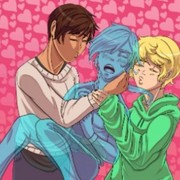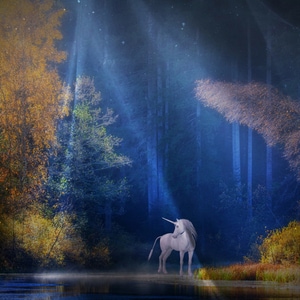John climbed down the cliff path with halting care. Something was wrong with his eyes. The cliff seemed far higher and starker than he remembered. Each time he glanced at his feet he thought he stared into a deep gash in the earth in which were set, like gems, houses of an elfin loveliness, lording it over gracious green plains that rolled into the distance. Then in the blink of an eye everything changed, and for a while the old familiar Dale was beneath him, and the familiar old path under his feet.
At last he made it safely to the foot of the slope and turned down the village road. Under his feet the white chalk gravel crunched and rolled and turned to pearls. Here was the smithy on his right, but it had changed too. It had grown not larger but infinitely more fair, as if the things he loved most about it were arrayed on its neck like a queen’s jewels. It was both his house as he recalled it, and his house as it should have been if he had ever found the time to work a new looping iron gate for the fowlyard or knocked three more windows into the south gable, paning them with cut crystal instead of puddled glass…
The front door. A rush of tenderness almost knocked tears into his eyes. How he loved that front door! Someone had polished it and inlaid it with silver wire in a pattern of birds and trees. Why had he not done so years ago? Glorious things should be glorified.
He put out his hand and touched the silver threads and under his fingers it returned to the battered old front-door he knew so well. But none the less dear for all that. John knocked.
The door opened on light and laughter. A man stood before him, a golden-haired young lord in rich array of red and gold and cerulean blue. John took off his cap and bowed. “Sir, let heaven shower all graces upon your lordship.”
The young man stared at him, mystified, and as he straightened, whispered, “John?”
With that the enchantment vanished again and John blinked at the young man who had been his brother. “Ned!”
Ned surged forward and clapped him into a rib-groaning embrace. “Saints keep us, John, but where have you been these long years?” He didn’t wait to hear the answer, but swept him into the warm smithy, crying “Mam! Lettice! It’s John!”
It was hard to focus on them. He was too exhausted to see them straight, and they flickered mazingly between robed dignitaries and his own familiar family. His mother came to him, but he was too confused by the flames shooting from her silvered head and the six wild wings beating from her shoulders to notice at first how slowly she limped, leaning on a staff. He took her hand and bowed and kissed it. Lettice Fuller was there—why was little Lettice Fuller there, and why did she sit in a throne? But no, it was only Lettice in a chair, levering herself up, coming to accept his homage on Ned’s arm with an unmistakeably royal air about the two of them—no, the three of them—how could they be married already, those two?
“John. You’ve changed, son.” It was Master Fuller, rising from his corner by the fire in a whirl of green robes.
“Sir,” John stammered, “by my faith, you are also much altered.”
“Five years will do it, John.”
“Five years I’ve been away?” He glanced around the little house and was struck speechless when a mastiff dragged its heavy body to its feet and came to meet him, wagging its tail and whining a welcome. “Why, Hal, sir! What do you here?”
He put out his hand to scratch behind the mastiff’s ears, but his hand met no solid object and he was suddenly staring around the shabby little room at Ned and Lettice, his mother and Master Fuller.
“Hal’s dead, John,” Lettice said. “Seven years come Candlemas. Do you not remember?”
John straightened. “Aye. I remember.”
His mother dropped a thin and frail hand on his arm. “Sit, John. Are you hungry?”
“No, madam.” At that honorific she looked almost injured, but John could bring himself to use no more familiar term. If his eyes began playing tricks on him again, he would see those wings, those flames—sun-bright, star-lovely. “You are close to heaven, lady,” he said to her. “I have come back to you in the very nick of time.”
She pulled back, a small sound of distress in her throat.
Ned was there, gripping him by the shoulders. “What’s wrong with you, John? Why do you speak like that? Can’t you see you’re frightening her?”
Lettice murmured, “Look how tired he is. John, if you will not eat, will you sleep?”
“Not for the world,” he muttered. “Neither bed nor board until I have found it and freed her. The Rose! Hidden here in Middleton Dale all the time! Among all these marvels! Was I blind?”
“Come outside, John.” Ned pulled him out the door and closed it behind them. Tonight, tall trees marched like pillars on either hand of the village street.
Ned faced him with his hands on John’s shoulders. “You haven’t drunk the wine of the Lordly Ones, have you?”
“I have tasted neither food nor drink since I left this fair dale.”
“Five years ago. What’s so fair about it? Have you been drinking something else?”
John stared vaguely about him. “Perhaps,” he admitted.
Ned sighed, took his hands from John’s shoulders, and fell back a step. “John, get a hold of yourself.”
“Sir—”
“And why do you sir us all? You must have been keeping fine company.”
“Not so fine as here.”
Ned shook his head with an uneasy laugh. “You have a touch of the moon, I think.”
John saw the uncertainty coming and going in his eyes and realised Ned was trying to decide what to do with him. That struck a cold shaft of soberness into his mind. If Ned thought him lunatick, he might find himself clapped into the lockup in the name of brotherly care. That was fair; it was what he would do himself—but Ned understood nothing of the case. Janet was still trapped in Faerie, and now that he was so close to finding the Rose, delay was intolerable.
From its nest further down in the valley among tall fair beeches, the church bells struck. Midnight.
John pulled himself together. “Not moonstruck, fair brother. Only mazed by the strange things that have happened to me since I left this house—hours ago, or days ago, by fay reckoning; I do not properly know.”
Ned seemed to have made up his mind. “You should come in and sleep.”
“Of your courtesy, no.” The sound of bells had faded away on the night air, but inside John’s mind they went on ringing and ringing to the words of a song that pulled at him, clutched at him, wellnigh snatched his heart from his breast.
…I heard them ring.
He fell back a step. “I will go speak to Parson Plumtree before I sleep.”
Ned’s face became suddenly tight and still. “Parson Plumtree is no longer here.”
“Why, where has he gone?”
“Since you left us, John, Queen Mary has burned many a candle before the saints and the Virgin.”
With the feeling of sliding into ice-cold water, John understood.
“She is dead now.” Ned shook himself out of melancholy. “The Lady Elizabeth is Queen. And so you find us sitting up late drinking to the dismal days. Had you come an hour ago, you would have heard the bells ringing with the news.”
The bells of Paradise, I heard them ring.
John turned on his heel and marched down the road toward the church. Ned started after him. “John, where are you going?”
John turned on him, half fierce, half smiling. “Let me be, brother. I am going to pray in the church awhile.”
Ned hesitated. John clapped him on the shoulder. “Come down and find me if I be not home within the hour.” He wheeled again and strode down the road toward the crossroads and St Martin’s, swept up in a song that carried him like a march…
Down in yon forest there standeth a hall,
The bells of Paradise, I heard them ring.
And another song tangled into this one like a counterpoint.
In that orchard there was an hall
That was hanged with purple and pall.











Comments (0)
See all